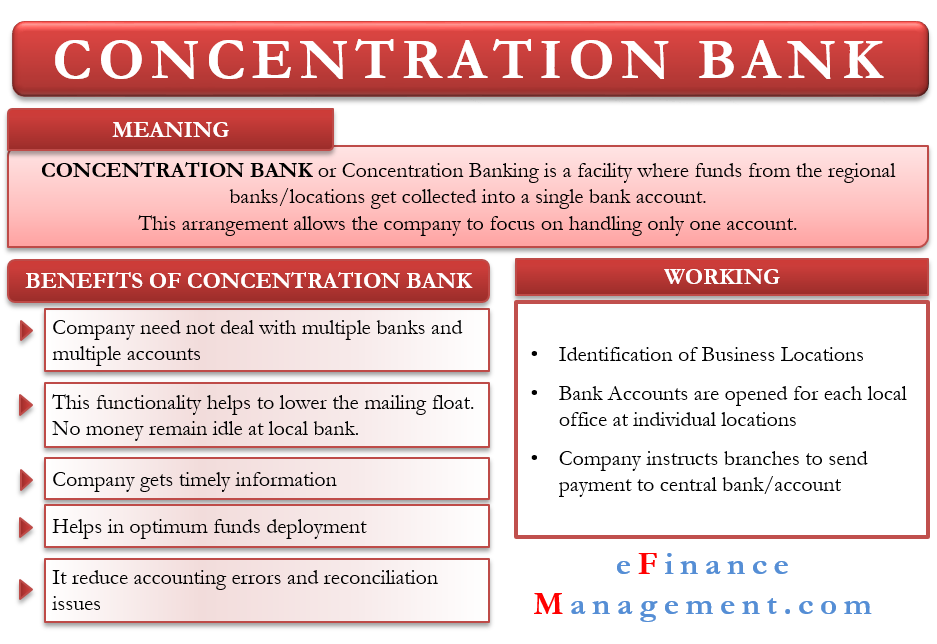Concentration Bank or Concentration Banking is a facility where funds from the regional banks/locations get collected into a single bank account. For example, a company has several stores across the country, and each store deposits the collections in the local branch. All these local deposits show up in one place centrally. This central account or the bank is termed a Concentration Bank or Concentration Banking arrangement.
So generally, an account wherefrom all significant transactions take place is the concentration account. And the bank handling that account is called the concentration bank. This arrangement allows the company to focus on handling only one account. It is the account from where it does all significant transactions. In other words, such an arrangement relieves the company from the task of managing several bank accounts.
How does it work?
- The concentration bank and the company identify all the locations where the company has offices or stores, or subsidiaries.
- The company opens a bank account with the local branches of the concentration bank. Somewhere even a single account with the concentration bank would suffice. It depends on the requirement and rules of the concentration bank.
- The company instructs the branches/stores/offices to send payment to that central/local account.
- So when the local branch collects the payment, it transfers those funds immediately to the concentration account.
Example
Assume Company XYZ has ten stores/branches in different regions in the U.S. Initially, every branch/store was responsible for managing its finances. However, such a practice started creating accounting issues. Moreover, it made auditing a time-consuming and costly affair.
To overcome such issues, Company XYZ took up concentration banking. Now, stores/branches transfer the entire collection or a part of their collection into the concentration account. The company can now decide to utilize these funds to its maximum advantage, including investment, to get optimum returns.
Also Read: International Banking

Why Concentration Bank
A company requires concentration banking arrangement if it has a large number of stores and offices across different locations.
In the absence of such a facility, the local managers need to take account-related decisions, such as investing idle cash. But, small funds in each account may limit the available options for investment at the local level. And so, the funds will mostly remain idle in these accounts, which are spread over multiple locations.
On the other hand, if a company uses such a banking arrangement, the person monitoring the central account would have all the funds under his control. That will ease investment decisions to optimize returns. Moreover, the company can think of hiring an investment manager to invest the funds.
Benefits
Following are the benefits of such a banking arrangement:
- Such an arrangement requires the company to keep all its bank accounts across different locations with one bank. So the company need not deal with multiple banks and multiple accounts.
- Sometimes opening one bank account at the central level will suffice, irrespective of the number of stores/branches/offices/locations if the bank’s rules permit this.
- Similar to lockbox banking, this arrangement helps to lower the mailing float or collection float. Because the funds collected by the local bank are transferred immediately to the concentration bank, and no money remains idle at the local level. And hence no free float.
- The company also gets timely information about the funds collected at the local branches.
- This facility also helps in optimum funds deployment because all the funds are available centrally in one place.
- It helps to reduce accounting errors and reconciliation issues because all the transaction information is available centrally.
Final Words
Concentration banks or banking could prove beneficial to a company with multiple stores or offices in different locations. However, for smaller firms with relatively fewer transactions, such a service may not be of much use. For a smaller quantum of funds, the cost of the transfer, etc., sometimes may not justify the arrangement.

